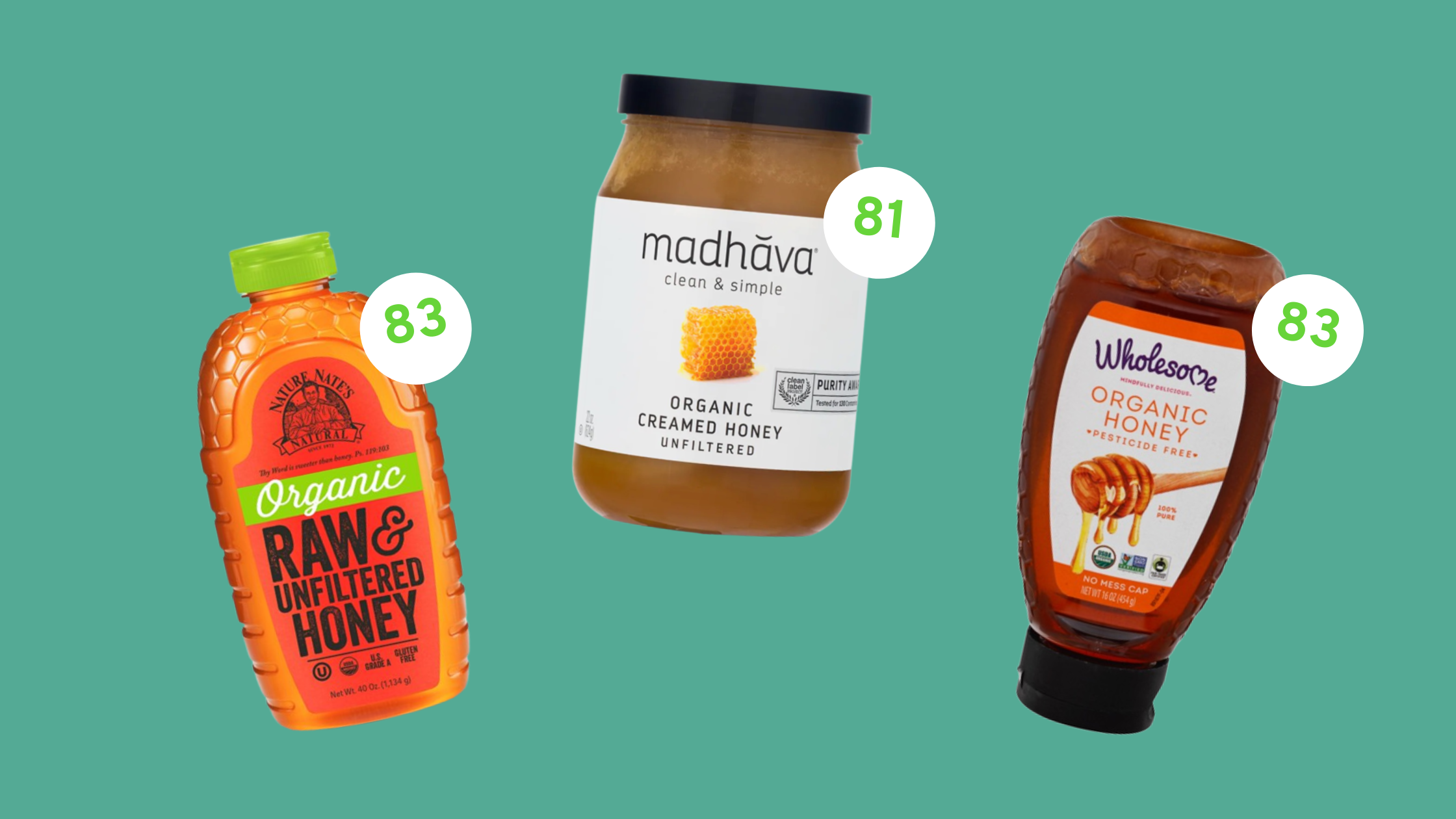Try our new free GreenChoice - Food Scanner mobile app!
DOWNLOAD-
-
-
Diets
Allergies
Take our 30-second quiz & we’ll filter our site to show only products that match your dietary preferences.
- GCNow
- Top 6 Organic Honey Brands
Top 6 Organic Honey Brands
Authors: Katherine Stallard, Sydney Wexler and Merve BasogluPublished: March 19, 2022

If you enjoy an extra touch of sweetness in your morning cup of tea and often find yourself reaching for the honey — you’re not alone. In 2020, Americans’ preferred sweetener was honey, beating out granulated white sugar for the first time in five years (1).
After years of being bombarded by tons of different hidden pseudo-names for added sugar and just as many unfamiliar artificial sweeteners, many of us have found ourselves reaching for natural sweeteners like honey to get our sweet-tooth fix.
The problem is, with all the different honey certifications out there, it can be hard to discern which labels are relevant to you. “Raw”, “unfiltered”, “pure”, and of course, “organic” are just a few of the claims that might make your head spin trying to figure out the difference.
The most important distinction to make, however, is between raw and organic honey.
Raw or unfiltered honey is a variation of honey that’s usually produced by small farms and left in its natural state without undergoing processing typical of most processed kinds of honey, like heat treatment or filtration (2).
Organic honey is more focused on the processes involved in the whole of honey production. Organic honey is concerned with its ecological effects and encourages the use of good agricultural practices to maintain balance and diversity in the agricultural ecosystem. The label “organic” on honey is meant to distinguish products that promote the sustainable use of natural resources, preservation of the environment, animal welfare, and human health (3).
Despite the initial panic you may feel facing honey in the grocery store, we’ve compiled a list of 9 of the best organic honey brands you can buy that will help satisfy your cravings and help you not sweat the sweet stuff.
How to choose the right organic honey
When it comes to selecting organic honey, there are a few things you should keep in mind.
- An Organic Certification. A USDA organic certification doesn’t make as much of a difference in finding quality honey as you might think. The USDA’s standards for certifying organic honey are questionable at best. There aren’t any specific requirements for honey to be certified organic, despite beekeepers contesting that anything within a 2 to 5-mile radius of the hive would have to be certified organic for the certification to hold any weight. Not to mention, imported organic honey gets its organic certification in the US because it was certified organic by the standards of its country of origin. The USDA does have one exemption for honey producers that sell less than $5,000 in which they do not require official certification, but they still must follow existing organic labeling expectations and requirements (4, 5).
- Sourcing. The way honey is harvested and sourced affects its quality and environmental impact. 40% of bee colonies died in 2019, and due to external factors like pesticide usage, rising temperatures, and other climate factors, bee numbers are dropping. Industrial sourced honey can harm bees, and studies show beekeepers that prioritize colony health with higher quality hive management will keep bees buzzing and honey flowing (6, 7).
- Nutritional value. Studies suggest that honey contains trace amounts of essential vitamins and antioxidants, which are linked with positive health effects, such as improved energy levels during exercise (8).
- Moderation. Organic honey’s sweetness comes from its natural composition of fructose and glucose, which means, at the end of the day, it’s still an added sugar. The main benefit of honey over cane sugar is that it’s higher in fructose – which is sweeter than glucose – meaning you can use less of it to achieve the same level of sweetness. The Dietary Guidelines suggest limiting added sugars to no more than 10% of daily calories, or 12.5 teaspoons a day on a 2,000-calorie diet. Indulge your sweet tooth but do so in moderation (8, 9).
The products included in this article were selected based on the following:
All of the products on this list are certified organic.
1. Nature Nate’s – 100% Pure Raw Filtered Organic Honey
6-pack, 1 lb each
Nature Nate’s 100% Pure Raw Filtered Organic Honey has some nutritional value, is moderately processed, and is estimated to have a very low carbon footprint.
Allergen info: Contains 0 known allergens.
Ingredients: 100% pure honey
- 4.8/5 stars (54 reviews)
- 83/100 GreenScore® rating
- Raw and unfiltered
2. Wholesome Sweeteners – 100% Pure Organic Honey
1 lb
Wholesome Sweeteners 100% Pure Organic Honey has some nutritional value, is moderately processed, and is estimated to have a very low carbon footprint.
Allergen info: Contains 0 known allergens
Ingredients: honey
- 4.1/5 stars (24 reviews)
- 83/100 GreenScore® rating
- Certified fair-trade
3. Wholesome – Organic Raw Unfiltered Honey
6-pack, 1 lb each
Wholesome Organic Raw Unfiltered Honey has a low nutritional value, is moderately processed, and is estimated to have a very low carbon footprint.
Allergen info: Contains 0 known allergens.
Ingredients: Organic Honey
- 4/5 stars (3 reviews)
- 81/100 GreenScore® rating
- Raw and unfiltered
- Certified fair-trade
4. Madhava – Natural Sweeteners Organic Very Raw Honey
6-pack, 1.38 lb each
Madhava Natural Sweeteners Organic Very Raw Honey has a low nutritional value, is moderately processed, and is estimated to have a very low carbon footprint.
Allergen info: Contains 0 known allergens
Ingredients: 100% Pure Organic Honey
- 81/100 GreenScore® rating
- Unfiltered
5. Glorybee – Honey & Supplies Organic Raw
6-pack, 1.12 lb each
Glorybee Honey & Supplies Organic Raw has a low nutritional value, is moderately processed, and is estimated to have a very low carbon footprint.
Allergen info: Contains 0 known allergens.
Ingredients: pure organic honey.
- 81/100 GreenScore® rating
- Raw
6. Wedderspoon – Organic Ginger With Echinacea Manuka Honey Drops
6-pack, 4 oz each
Wedderspoon Organic Ginger With Echinacea Manuka Honey Drops has a low nutritional value, is moderately processed, and is estimated to have a very low carbon footprint and a very low water footprint.
Allergen info: Contains 0 known allergens.
Ingredients: organic cane sugar, organic manuka honey, organic brown rice syrup, ground ginger, echinacea.
- 4.8/5 stars (55 reviews)
- 76/100 GreenScore® rating
Key takeaways for choosing organic honey
The grocery store is saturated with many sweetener options to help fulfill your sweetness craving, but organic honey offers an equally sweet natural alternative to the artificial sweeteners that line stores shelves.
When choosing, keep an eye out for the USDA Organic seal, but weigh the authenticity and significance of a USDA certification versus other factors, like sourcing and nutrition.
Another thing to keep in mind is the source of the honey. Although organic honey beekeepers tend to be more conscientious and attentive with their honey bees and their environment, it’s critical to ensure that its harvesting doesn’t harm bee populations or further environmental degradation.
Not only does organic honey provides additional vitamins and antioxidants, but it’s also sweeter than sugar, making it a preferable choice for those looking to reduce their intake of added sugar but still achieve the perfect amount of sweetness. By keeping your honey consumption limited and well-researched — with the use of this list — you can trust that your honey choice will be better for you and better for the bees too.
***
GreenChoice, PBC has evaluated and rated more than 340,000 food & beverage products across hundreds of attributes related to diet, health, and sustainability. Easily find the best products for you, the planet, & your budget. Sign up to access the GreenChoice marketplace, the first carbon-neutral online grocery marketplace for healthy, climate-friendly shopping.




